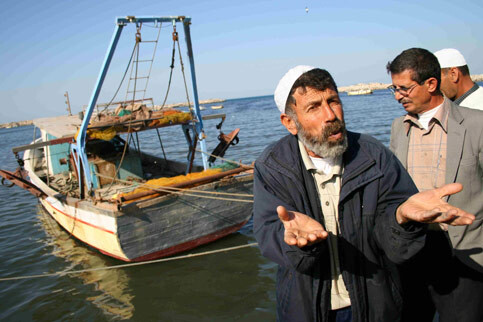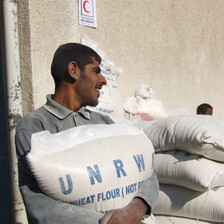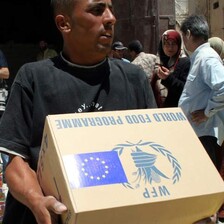The Electronic Intifada 30 April 2007

A fisherman in Gaza City shows his frustration at the Israeli ban on fishing off Gaza, which is exacerbating the lack of food in the Strip. (Tom Spender/IRIN)
JERUSALEM, 29 April 2007 (IRIN) - A recent United Nations report reveals that the humanitarian situation in the occupied Palestinian territories (oPt) continued to deteriorate in the second half of last year, largely because of a collapsing economy.
Many Palestinians fell further into poverty. The Gaza Strip was the hardest hit with about 80 percent of households earning less than US $1 a day, twice the percentage of those earning that little in the West Bank.
Published by the UN Agency for Palestine Refugees (UNRWA), the report indicates that the international boycott on the Palestinian Authority (PA), coupled with Israel’s withholding of tax revenues destined for oPt had the harshest affects on the PA’s ability to offer basic services.
This situation is unlikely to change soon, not least as Louis Michel, the European Commissioner for Development and Humanitarian Aid, said this week in Tel Aviv that Europe, formerly a major donor to the PA, will continue to bypass the PA and would not give the government direct aid.
“There will not be a change in the system,” he said.
Following Hamas’ victory in January 2006 elections, and the group’s subsequent entry into government, the PA has faced an international boycott because Hamas refuses to recognise Israel or renounce violence or abide by certain previous agreements.
The boycott includes a freeze on aid money to the PA, which has cut its budget by about 35 percent, according to the report, and has made paying employees a difficult task, leading to prolonged public sector strikes and a breakdown of services.
One aid worker commented that in addition to the PA’s growing inability to conduct state roles and services, international investments in PA institutions over the years are now “going to waste” as projects are being frozen.
Furthermore, unemployment in oPt remains high, as about 40 percent of adults are without work. The Palestinian GDP dropped by more than 40 percent since the renewed outbreak of violence in September 2000.
This has made more Palestinians dependant on aid at a time when aid agencies are struggling to raise the required funds to meet the needs of oPt residents.
Filippo Grandi, UNRWA’s deputy commissioner-general, recently said that he expects to receive less than half of the US $250 million his organisation has asked for in its 2007 emergency appeal for the West Bank and Gaza Strip.
Intense Israeli military action
In addition to intense Israeli military action in the second half of 2006, which left 505 Palestinians dead and many more injured, the military has also tightened restrictions on movement, the report says, leading to further economic decline.
The Israeli system of checkpoints and travel permits “has made travel between different areas of the West Bank more difficult, effectively cutting the territory into three”.
“The [Palestinian] economy is almost completely devastated,” Karen AbuZayd, commissioner-general of UNRWA, said last week while in Brussels trying to raise funds.
Shlomo Dror, a spokesman for the Israeli military’s humanitarian coordination section, said Israel is not to blame. “Israel has a right to defend itself, even using military action. Kassam [homemade Palestinian] rockets are fired regularly at Israel from Gaza. The PA does not take action against the militants,” he said.
Regarding the withheld tax money, Dror said, “Because of the Hamas government, there is no one to talk to and arrange the offset of funds so the money can be given to the Palestinians.”
Earlier this year, the World Bank issued a report suggesting that alternative routes be found because of the Israeli restrictions on Palestinian movement, particularly movement of goods.
However, the report’s recommendations, which include allowing Palestinians to increase trade via Jordan and Egypt, have not yet been implemented, according to the World Bank.
The Karni Crossing, the Gaza Strip’s main commercial crossing point, “was open for less than 50 percent of scheduled opening days”, during the six-month period, UNRWA said.
The report also indicates that internal strife between Palestinian factions has compounded the crisis.
To counter this deteriorating situation, which has hit Palestinian refugees in particular, UNRWA has offered job placement programmes, mostly within the agency itself, as well as health and emergency food programmes to meet the needs of the population.
However, many senior aid workers say that a political solution is needed to solve the current fiscal crisis in the Palestinian territories and that humanitarian aid can only help in the short-term.
This item comes to you via IRIN, a UN humanitarian news and information service, but may not necessarily reflect the views of the United Nations or its agencies. All IRIN material may be reposted or reprinted free-of-charge; refer to the copyright page for conditions of use. IRIN is a project of the UN Office for the Coordination of Humanitarian Affairs.

